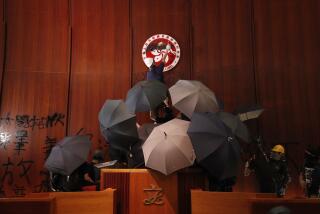Trials of Activists Highlight China’s View on Dissent
- Share via
BEIJING — BEIJING -- Two Chinese courts have begun the new year with trials of labor and political activists, signaling the government’s continued intolerance of dissent in the wake of the recent leadership changes in the Communist Party.
In a closely watched case in northeastern China, two men appeared in court Wednesday for their involvement in massive demonstrations last year that drew international attention to the plight of workers in the country’s depressed Rust Belt.
The two men, Yao Fuxin and Xiao Yunliang, rallied thousands of workers in the city of Liaoyang to press for unpaid wages and benefits.
The protests went on for days until police broke them up and arrested the ringleaders.
Reflecting the seriousness with which the Communist regime views such challenges to its authority, Yao and Xiao, both in their 50s, have been charged with subversion, a serious offense that can bring the death penalty, although such a severe sentence would be unlikely.
Similarly, a man in northwestern China who posted Internet articles critical of the government has been tried on subversion charges, a human rights group reported Wednesday.
Tao Haidong, 45, is awaiting a verdict in the region of Xinjiang, an area under constant scrutiny by Chinese authorities because of separatist sentiment among the local Muslim population.
Although a new, younger crop of leaders ascended to the top of the party hierarchy two months ago, there is little indication that any political liberalization is in the offing to accompany the vast economic changes China has undergone in the past 20 years.
That economic transformation has spawned increasing discontent among those left behind in the race to get rich, including millions of state workers left jobless by China’s market-oriented reforms.
Yao and Xiao tapped into that frustration in March when they and workers from a variety of sectors swarmed Liaoyang’s City Hall for several days. Some of the demonstrations culminated in clashes with police, who later took Yao, Xiao and two others into custody. The other two men have been released and are not on trial.
Human rights groups around the world have monitored the Liaoyang case closely and expressed outrage over the government’s treatment of the two men, who had engaged in an activity that is theoretically guaranteed under the Chinese Constitution.
“If they are convicted of ‘subversion’ after doing nothing more than peacefully exercising their rights to freedom of expression, association or assembly, we would consider them to be prisoners of conscience,” Amnesty International said in a statement.
In Urumqi, the capital of the restive Xinjiang region, Tao went on trial this month for writing articles that allegedly slandered China’s leaders and warned of an impending economic collapse.
According to the New York-based group Human Rights in China, this is not Tao’s first run-in with the authorities. Last year, he spent two months in a labor camp for editing a book that contained calls for greater democracy, the group said.
The arrests and trials of dissidents add to the picture outlined in the State Department’s recent annual human rights report, which said that China continues to lock up the regime’s vocal critics.
Activists were cheered by the release last month of democracy advocate Xu Wenli, perhaps China’s best-known political dissident. But they noted that the release, and exile, of Xu to the U.S. on medical grounds was largely a gesture to Washington and not a harbinger of political loosening in the world’s last remaining Communist giant.
More to Read
Sign up for Essential California
The most important California stories and recommendations in your inbox every morning.
You may occasionally receive promotional content from the Los Angeles Times.














